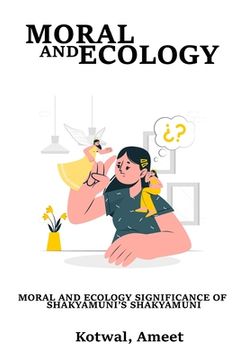Compartir
Moral and Ecological Significance of Shakyamuni's Sakyamuni Paperback (en Inglés)
Kotwal Ameet
(Autor)
·
Cerebrate
· Tapa Blanda
Moral and Ecological Significance of Shakyamuni's Sakyamuni Paperback (en Inglés) - Ameet, Kotwal
S/ 183,39
S/ 366,78
Ahorras: S/ 183,39
Elige la lista en la que quieres agregar tu producto o crea una nueva lista
✓ Producto agregado correctamente a la lista de deseos.
Ir a Mis Listas
Origen: Estados Unidos
(Costos de importación incluídos en el precio)
Se enviará desde nuestra bodega entre el
Martes 28 de Mayo y el
Martes 11 de Junio.
Lo recibirás en cualquier lugar de Perú entre 2 y 5 días hábiles luego del envío.
Reseña del libro "Moral and Ecological Significance of Shakyamuni's Sakyamuni Paperback (en Inglés)"
The Sakyamuni: Buddha was born in or about 560 B.C. after realizing that all worldly things and beings are short lived and temporary, he determined to forsake his home and try if he could discover some means of immortality to remove the sufferings of human beings. He made his Great Renunciation i.e. Mahaparinirvāna and after a regress ascetism of six years he attained the enlightenment. It is very difficult to describe exactly the nature of his enlightenment but what passed as his preaching's in the form of philosophy was the theory of Pratityasamūtpāda i.e. the twelve fold chain of causation, which is supposed to explain the mystery of the world. The early Buddhist philosophy did not accept any fixed entity or being as determining the nature of all realities. Subjectivity becomes the key note of early Buddhism. Although the Buddha belongs to the ancient India, he has been unanimously spoken of by the scholars of every spheres that his approach to the problems of life was rational one. He tried to give these worldly explanations of these worldly events. He rejected all the metaphysical entities, authority of the Holy Scriptures and exhorted people to be guided solely by what their own reasoning approved. He always asked the people not to accept even what the Buddha said until their own reasoning found it convincing. The Buddha himself was a complete embodiment of what he preached. But these rational elements were either diluted or drowned in the commentaries of the later authors wrote upon what the Buddha had said. This happened because even the Buddha's disciples understood him in their own different and peculiar ways. Moreover Buddhism acquired local elements of the different lands to which it spread and even the exact opposites of what the Buddha taught also got into Buddhism. As we know that an account of Buddhism necessarily begins with the Buddha. Though he is not regarded by his followers either as incarnation of God or as prophet, from him as the perfectly enlightened and boundlessly compassionate teacher of all sentient beings proceeds the unique message of the path to enlightenment, and it is therefore, his figure, either in its original human form or in various idealized hypostases, which dominates the entire history of Buddhism. His spirit, action not only during eighty years of earthly life, but now.
- 0% (0)
- 0% (0)
- 0% (0)
- 0% (0)
- 0% (0)
Todos los libros de nuestro catálogo son Originales.
El libro está escrito en Inglés.
La encuadernación de esta edición es Tapa Blanda.
✓ Producto agregado correctamente al carro, Ir a Pagar.

